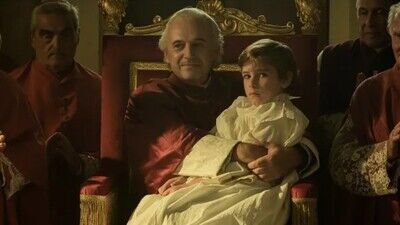Until it is: when a representative of a Jewish newspaper in Bologna gets an audience with the Pope and is essentially warned to knock it off, nearly as much attention is paid to the tone and presentation of the visitors’ statements as their substance. “Lower your voice and kneel down; have you forgotten whose presence you are in?” the Pope warns. Then he adds, “I could hurt you very badly. I could force you back into your hole. Do you remember when the ghetto gate was closed from dusk to dawn, or have you already forgotten?” When the tables are turned even slightly on Feletti by representatives of the (secular) legal system, he gets his back up at being challenged. “I would like to make clear that the decisions, the judgments of the Church, are not subject to any other authority of an inferior position,” he warns court officials who have come to interrogate him.
The movie depicts the 19th century Church as a corrupt, brutal, power-drunk organization that positioned itself as as a middleman between God and individuals in order to crush rival faiths, enforce patriarchy, guilt-trip most of the subjugated population into “donating” to them and obeying their edicts, and siphon off or steal material wealth and real estate. (Late in the movie, when it becomes clear that the Papal States are about to get smacked down by the secular government, the top bosses of the Church immediately begin discussing where to hide all the treasures they’ve amassed.)
And yet not one of the frocked characters conducts himself onscreen as a mustache-twirling bad guy. They’re shown mainly as bureaucrats in turned-around collars: company men. Pope Pius IX sometimes seems as if he’s about to turn into an especially hiss-able exception. But the way Pierobon plays him (with a childlike comportment and self-loathing undertone that evokes the late Ian Holm) you get the sense that he’s not merely twisted by life among the super-powerful, but that he’s also got mental problems that will never be properly diagnosed.

